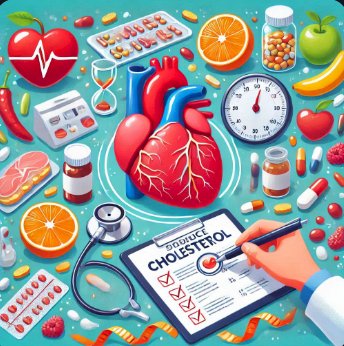How to Reduce Cholesterol Levels: A Comprehensive Guide
Maintaining healthy cholesterol levels is crucial for heart health. High cholesterol can lead to various cardiovascular diseases, including heart attacks and strokes. Fortunately, there are several effective strategies to lower cholesterol levels naturally. In this article, we will explore practical tips and lifestyle changes to help you reduce cholesterol levels and improve your overall health.

Maintaining healthy cholesterol levels is crucial for heart health. High cholesterol can lead to various cardiovascular diseases, including heart attacks and strokes. Fortunately, there are several effective strategies to lower cholesterol levels naturally. In this article, we will explore practical tips and lifestyle changes to help you reduce cholesterol levels and improve your overall health.
1. Adopt a Heart-Healthy Diet
a. Increase Fiber Intake
Soluble Fiber: Foods rich in soluble fiber, such as oats, beans, lentils, fruits, and vegetables, help reduce the absorption of cholesterol in the bloodstream.
Whole Grains: Whole grains like brown rice, quinoa, and whole wheat bread are excellent sources of fiber that can lower cholesterol levels.
b. Choose Healthy Fats
Unsaturated Fats: Opt for unsaturated fats found in olive oil, avocados, and nuts. These fats can help reduce LDL (bad) cholesterol.
Omega-3 Fatty Acids: Incorporate fatty fish such as salmon, mackerel, and sardines into your diet. Omega-3 fatty acids are known to lower triglycerides and improve heart health.
c. Avoid Trans Fats and Limit Saturated Fats
Trans Fats: Found in many processed foods and margarine, trans fats increase LDL cholesterol and decrease HDL (good) cholesterol.
Saturated Fats: Limit intake of saturated fats found in red meat, full-fat dairy products, and certain oils like coconut oil.
2. Exercise Regularly
Physical activity is essential for maintaining healthy cholesterol levels. Regular exercise can help raise HDL cholesterol while lowering LDL cholesterol and triglycerides. Aim for at least 30 minutes of moderate-intensity exercise, such as brisk walking, jogging, or cycling, on most days of the week.
3. Maintain a Healthy Weight
Carrying excess weight can negatively impact your cholesterol levels. Losing even a small amount of weight can help lower LDL cholesterol and triglycerides while increasing HDL cholesterol. Focus on a balanced diet and regular exercise to achieve and maintain a healthy weight.
4. Quit Smoking
Smoking is harmful to your heart and can lower HDL cholesterol. Quitting smoking improves HDL cholesterol levels and benefits overall heart health. Seek support from healthcare professionals or smoking cessation programs to help you quit successfully.
5. Limit Alcohol Intake
While moderate alcohol consumption may have some heart benefits, excessive drinking can lead to high cholesterol and other health problems. Limit your alcohol intake to no more than one drink per day for women and two drinks per day for men.
6. Consider Supplements
Certain supplements can help reduce cholesterol levels. Discuss with your healthcare provider before starting any supplements to ensure they are safe and appropriate for you. Some popular options include:
Plant Sterols and Stanols: These compounds, found in some fortified foods and supplements, can help block cholesterol absorption.
Fiber Supplements: If you have trouble getting enough fiber from your diet, consider taking a fiber supplement such as psyllium.
7. Regular Health Check-Ups
Regular check-ups with your healthcare provider are crucial for monitoring your cholesterol levels and overall heart health. Your doctor can provide personalized recommendations and prescribe medications if necessary.
Conclusion
Lowering cholesterol levels involves a combination of dietary changes, regular exercise, and healthy lifestyle choices. By adopting these strategies, you can improve your heart health and reduce the risk of cardiovascular diseases. Always consult with your healthcare provider before making significant changes to your diet or exercise routine.
By following these tips, you can take control of your cholesterol levels and enjoy a healthier, more vibrant life.

 Ashish Kumar
Ashish Kumar 












